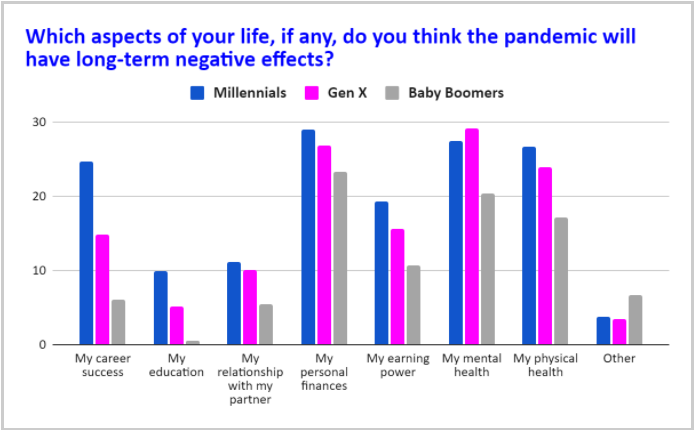
Just Half of US Population With Anxiety Has Sought Professional Help; Even Lower for Those Dealing With Stress and Insomnia
NEW YORK / AGILITYPR.NEWS / May 12, 2021 / Just Half of US Population With Anxiety Has Sought Professional Help; Even Lower for Those Dealing With Stress and Insomnia
Adults Worried About Long-Term Negative Impact of Pandemic on Mental Health, Career Success, Finances and More
As the US begins Mental Health Awareness Month, new research from GWI, a leading audience targeting and consumer research company, is helping paint a bigger picture of how US adults are feeling about their mental and physical health, and the long-term negative impacts the pandemic may have on their lives.
Millennials, Gen X Adults Are Worried About Mental and Physical Health, Careers, Finances as Result of Pandemic
The pandemic and quarantine introduced novel and unexpected challenges in millions of Americans' lives over the past year, especially in the areas of health, money, family and career. When asked about the long-term impact of the pandemic in some of these important areas, adults are noticeably worried about what may lie ahead.
- Nearly three in 10 (28%) Millennials think the pandemic will have a long-term negative impact on their mental health, with nearly as many (27%) saying this about their physical health. Millennials also worry the pandemic will negatively impact their career success (25%) and personal finances (29%); 19 percent of Millennials said they believe the pandemic will negatively impact their earning power.
- Three in 10 (29%) Gen X adults are also worried about the long-term negative effects of the pandemic on their mental health, and nearly as many (24%) as worried about the effects on their physical health; 27 percent said they think the pandemic will have long-term negative effects on their personal finances and 16 percent think it will negatively impact their earning power.
“Older Millennials and younger Gen Xs have now been working-aged adults in at least two ‘once in a generation’ market crashes, and there remains a huge disparity in their purchasing power versus that of their parents at the same age. High costs of living and low relative wages only add to the anxiety many are feeling in these age groups, compared to other generations,” said GWI Trends Analyst Doug Gorman.
Trend Data Shows Steady Increases in Adults’ Anxiety, Stress and Depression Over Past Year
In addition to worrying about their mental health, finances and career trajectory, consumers have also indicated that anxiety and stress are still keeping them up at night a year after the start of the pandemic, and in some instances, quite literally. Examining how adults’ anxiety, stress and insomnia issues have changed over time:
Anxiety
- 40 percent of Gen Zs said they experienced anxiety in the past 12 months when asked in Q1 2021, up from 38 percent in Q2 2020.
- 32 percent of Millennials said they experienced anxiety over last year when asked in Q1 2021, up from 28 percent in Q2 2020.
- Gen Xs have also experienced an increase in anxiety since Q2 2020: 28 percent said so in Q1 2021 compared to 24 percent in Q2 2020.
Stress
- 43 percent of Gen Zs in Q1 2021 said they had experienced stress in the past 12 months - rising from 40 percent in Q2 2020.
- 39 percent of Millennials reported experiencing stress in Q1 2021, up from 36 percent in Q2 2020.
- More Gen X adults in the US have also reported experiencing stress: 38 percent said so in Q1 2021, up from 35 percent in Q2 2020.
Insomnia
- Gen X adults are losing more sleep now than when asked in Q2 2020: 23 percent said they have experienced insomnia in the past 12 months in Q1 2021, rising from 18 percent in Q2 2020.
- 20 percent of Gen Zs and 18 percent of Millennials say they have experienced in the past year, compared to 20 and 16 percent, respectively, in Q2 2020.
Half of US Adults Think We Should be More Open About Mental Health
Research also finds that more people have increased their support of being more open about mental health. According to GWI:
- Half (49%) of US adults on average think we should be more open, similar to Millennials (49%) Gen X (49%) and Baby Boomers (48%).
- Slight more adults in the Gen Z age groups (53%) think we should be more open about mental health.
Adults With Anxiety Seemingly Neglecting Treatment, With Just Half Admitting to Doing So
There’s no question the pandemic has changed how adults feel, but the question remains if those currently experiencing anxiety have taken steps to do anything about it. And according to GWI, while many have made lifestyle changes to lighten the load, many have yet to make the move to seek professional help.
- Just 50 percent of average US adults with anxiety said they have visited a doctor or healthcare provider about it.
- Slightly more Gen X adults with anxiety have visited a doctor or healthcare provider (55%) regarding their anxiety; 48 percent of Millennials and 46 percent of Gen Zs with anxiety have also done so.
Methodology: This data is from GWI’s USA dataset fielded in Q2 2020 and Q1 2021. It is representative of 40,994 U.S. internet users aged 16+, of which 10,940 are millennials, 12,598 are Gen X, 11,242 are baby boomers. In the past year, 5,053 have experienced anxiety, 7,106 have experienced stress, and 3,876 have experienced insomnia.

Contacts
Kathy Grannis Allen
Director, Media Relations
kathy@salientmg.comPhone: 2028217513
www.globalwebindex.com